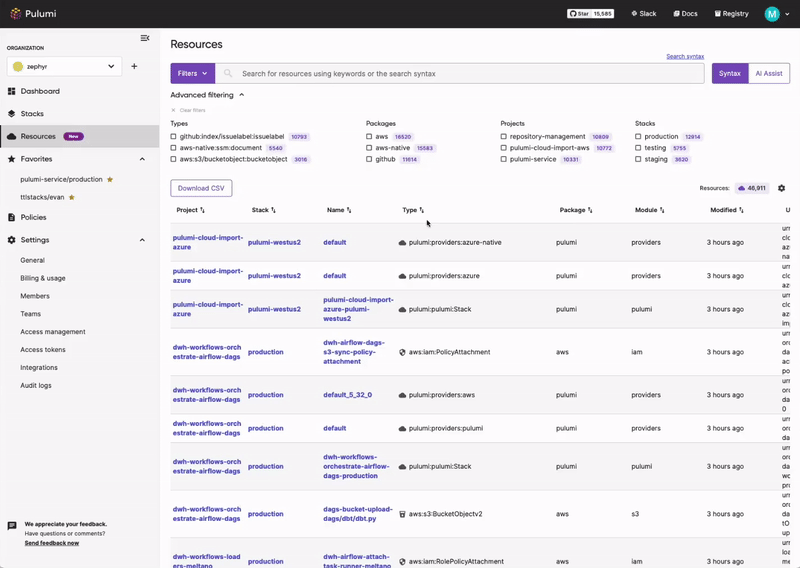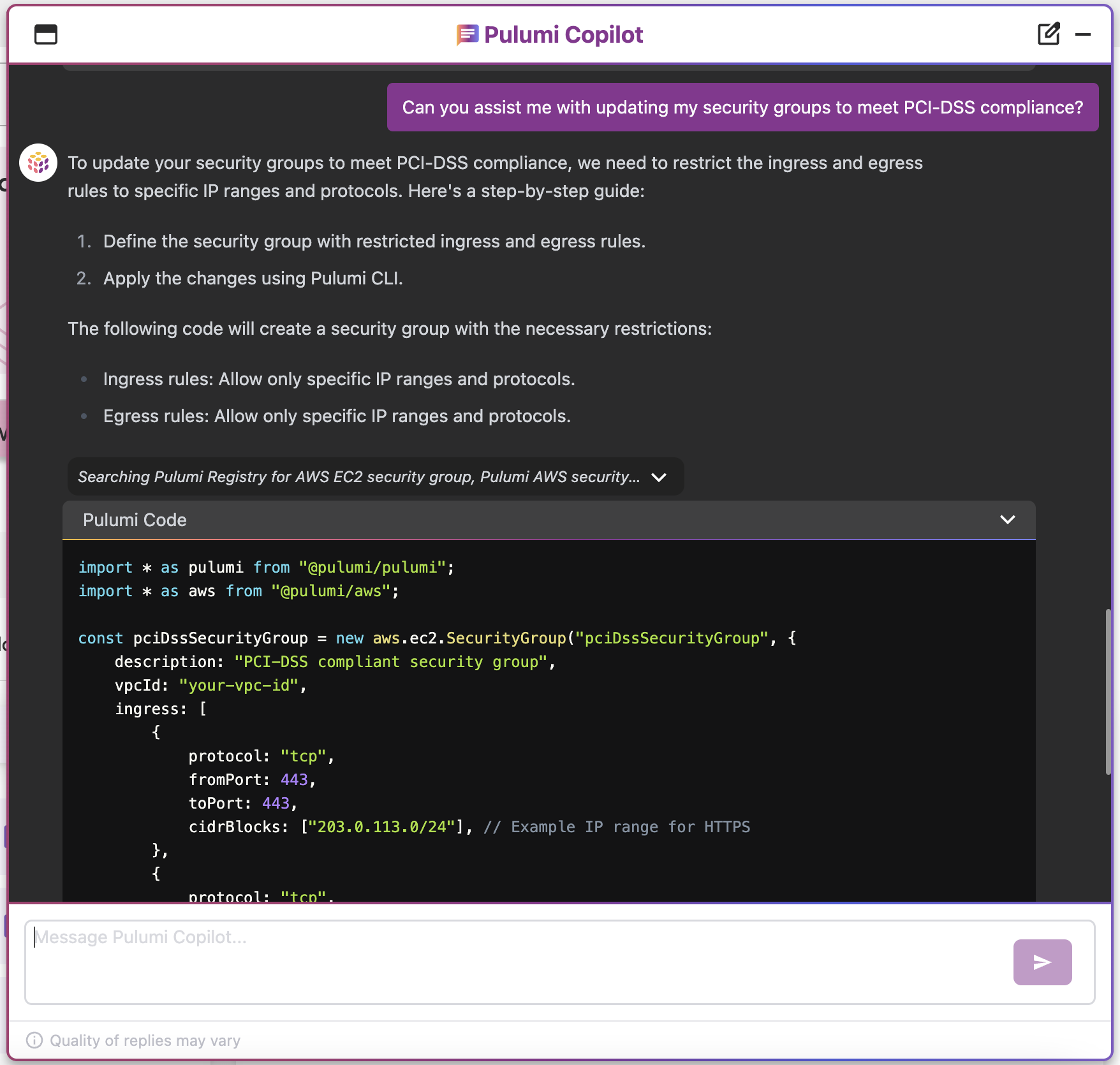How to Achieve PCI DSS Compliance for Google Cloud Identity
How to Achieve PCI DSS Compliance for Google Cloud Identity
PCI DSS compliance is critical to protecting cardholder data that is processed, stored, and transmitted. Pulumi can assist you with making your Google Cloud infrastructure PCI DSS compliant. Pulumi can help you identify existing cloud resources that are not in compliance, and it can also enforce compliance policies proactively before infrastructure is deployed. Get started with Pulumi to use these compliance tools or speak with a Solutions Architect to get an expert consultation.
What is PCI DSS Compliance?
PCI DSS (Payment Card Industry Data Security Standard) compliance refers to the adherence to a set of security standards designed to protect card information during and after a financial transaction. These standards are established by the Payment Card Industry Security Standards Council (PCI SSC), which was founded by major credit card companies like Visa, MasterCard, American Express, Discover, and JCB.
Key Aspects of PCI DSS Compliance
- Security Controls: Organizations must implement specific technical and operational security measures to safeguard cardholder data. This includes requirements like installing firewalls, encrypting cardholder data, and using antivirus software.
- Access Control: Only authorized personnel should have access to cardholder data. This involves setting up strong access control measures, such as unique user IDs and restricting physical access to sensitive data.
- Monitoring and Testing: Regularly monitor and test networks to ensure that security controls are functioning correctly and to identify vulnerabilities. This includes maintaining logs of all access to network resources and cardholder data.
- Information Security Policy: Organizations must maintain a policy that addresses information security for employees and contractors. This includes regular security awareness training.
- Regular Audits: Organizations that process, store, or transmit credit card information must undergo regular audits to ensure they are in compliance with PCI DSS requirements. This can involve self-assessment or external assessments, depending on the size of the organization and the volume of transactions processed.
Pulumi Insights
Use Pulumi Insights to gain visibility into your cloud infrastructure's configuration to assess PCI DSS compliance. Pulumi Insights is Intelligent Cloud Management. It helps you gain security, compliance, and cost insights into the entirety of your organization's cloud assets and automatically remediate issues.

Pulumi Copilot
Use Pulumi Copilot to assist configuring your infrastructure to make it compliance ready. You can tap into the Pulumi Copilot's deep understanding of your organization's context to gain visibility into the configuration of resources and assess their compliance.

Compliance Ready Policies
With comprehensive coverage of Google Cloud, Pulumi Compliance Ready Policies provide an enhanced level of control and governance over your cloud resources. Pulumi Compliance Ready Policies empower you to enforce best practices, security standards, cost controls, and compliance requirements seamlessly within your infrastructure-as-code workflows.
What is Google Cloud Identity?
Google Cloud Identity is an Identity as a Service (IDaaS) and enterprise mobility management (EMM) platform that offers the identity services and endpoint administration that are available in Google Workspace as a stand-alone product. It provides features like single sign-on (SSO), multi-factor authentication (MFA), and device management, helping organizations secure user identities and manage access to resources across their entire ecosystem.
What controls can I put in place to evaluate Google Cloud Identity resources?
- Cloud Identity roles should not allow full administrative privileges with wildcard actions (*)
- Cloud Identity users should not have custom roles or policies attached that grant excessive permissions
- Cloud Identity users' credentials should be rotated every 90 days or less
- Cloud Identity tenant administrator accounts should not have direct access keys
- Multi-Factor Authentication (MFA) should be enabled for all Cloud Identity users with access to the Google Cloud Console
- Hardware MFA should be enabled for super admin accounts
- Password policies for Cloud Identity users should enforce strong configurations, including complexity requirements
- Unused Cloud Identity user credentials should be removed after a specified period
- MFA should be enabled for all Cloud Identity users with administrative access
- Password policies for Cloud Identity users should have strong configurations
- Ensure Cloud Identity password policy requires at least one uppercase letter
- Ensure Cloud Identity password policy requires at least one lowercase letter
- Ensure Cloud Identity password policy requires at least one symbol
- Ensure Cloud Identity password policy requires at least one number
- Ensure Cloud Identity password policy requires a minimum password length of 14 or greater
- Ensure Cloud Identity password policy prevents password reuse
- Ensure Cloud Identity password policy expires passwords within 90 days or less
- Ensure a support role has been created for incident management and Google Cloud support
- MFA should be enabled for all Cloud Identity users
- Cloud Identity custom roles created should not allow wildcard actions
- Cloud Identity user credentials that have been unused for 45 days or more should be removed
- Cloud Identity roles should be labeled for governance
- Cloud Identity users should be labeled for better access control and auditing
- Expired SSL/TLS certificates managed in Cloud Identity should be removed
- Cloud Identity identities should not have excessive permissions like full Cloud Shell access
- Cloud Identity Access Reviews and Conditional Access policies should be enabled for security monitoring
Speak to a Solutions Architect to implement policy as code to manage Cloud Identity resources for PCI DSS compliance.
Talk to a Solutions Architect
Get in touch with our Solutions Architects to get all your resources in use with Pulumi Insights